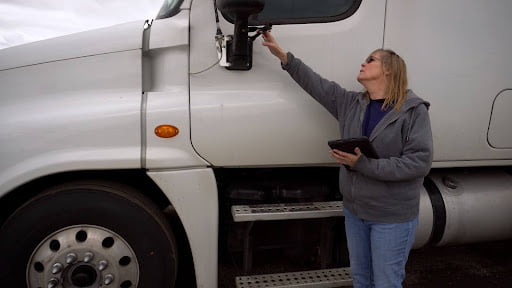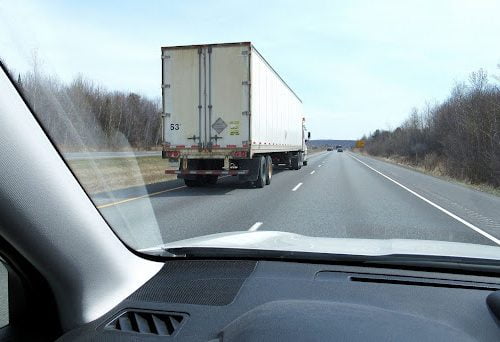State vs. Federal Trucking Laws
Trucking regulations in Massachusetts involve a combination of both state and federal laws. State laws specifically address regional road safety and operational standards, while federal laws, primarily governed by the Federal Motor Carrier Safety Administration (FMCSA), set nationwide standards. Key areas of federal oversight include FMCSA regulations and Hours of Service rules, which are crucial for maintaining safety and preventing fatigue among drivers. Truckers and trucking companies must comply with both sets of trucking laws in Massachusetts to lower the risk of a passenger vehicle being in a collision with a truck
Federal Motor Carrier Safety Administration (FMCSA) Regulations
In Massachusetts, trucking operations must adhere to FMCSA regulations, which establish nationwide standards for commercial vehicle safety. These regulations encompass a broad spectrum of requirements, from driver qualifications to vehicle maintenance.
Under the Work and Family Mobility Act starting July 2023, Massachusetts residents, irrespective of immigration status, can obtain a standard driver’s license. This ensures a broader pool of qualified drivers who must still meet all safety and skill standards, including permit exams and road tests.
The International Registration Plan (IRP) is another key aspect of FMCSA, facilitating interstate travel for commercial vehicles. This agreement allows carriers based in one jurisdiction to register and pay fees in their base jurisdiction, which are then apportioned among all the IRP jurisdictions they operate in based on mileage and weight.
Additionally, the International Fuel Tax Agreement (IFTA) plays a significant role in trucking regulations. This agreement, administered by the Massachusetts Department of Revenue, requires interstate commercial vehicles to register and report fuel use, simplifying fuel tax payments for vehicles traveling in multiple jurisdictions. Massachusetts-based carriers must renew their IFTA registration annually and file quarterly returns.
For trucks exceeding certain size and weight limits, Massachusetts mandates special permits. The MassDOT Highway Division’s web-based system, OASIS, streamlines the process for obtaining these permits, ensuring compliance with both state and federal regulations regarding vehicle dimensions and load.

Hours of Service Violations in Massachusetts
The Hours of Service regulations include specific limits such as:
- The 14-Hour Shift Window: Drivers have a total of 14 hours per shift, which encompasses all work activities including driving, loading, unloading, and break times. Once a driver completes the 14-hour shift, they are required to take a minimum of 10 consecutive hours off-duty before driving again.
- The 11-Hour Driving Limit: Within the 14-hour shift window, drivers are restricted to a maximum of 11 hours of driving.
- The 30-Minute Driving Break: After 8 consecutive hours of driving, a driver must take a mandatory 30-minute break.
- Weekly Driving Limit: Drivers are limited to working no more than 60 to 70 hours over a 7-day or 8-day period, respectively, as per regulatory guidelines.
Massachusetts Commercial Truck Permits
According to the Massachusetts Department of Transportation, the size and weight limits for commercial trucks that affect whether a permit is needed are as follows:
- Weight Limitations: Contact the permits department for specifics regarding weight limitations for your truck.
- Height Limitations: A special permit is not needed if your truck, including its load, does not exceed a width of 8 ft. 6 in. (for tunnel routes) or a height of 13 ft. 6 in. (for non-tunnel routes). Specific height restrictions also depend on the route and vehicle type, with different maximum heights allowed for various tunnels and locations across the state.
- Length Limitations: The maximum length of your vehicle affects permit requirements. For instance, the limit is 33 feet for standard motor vehicles, 40 feet for trucks, and 53 feet for semi-trailers. Articulated buses and certain types of transporters, like stinger-steered automobiles and boat transporters, have length limits of up to 75 feet.
- Holiday Restrictions: There are movement restrictions on specific holidays such as New Year’s Day, Memorial Day, Independence Day, Labor Day, Thanksgiving Day, and Christmas Day. Additional restrictions apply to the days preceding and following New Year’s Day, Independence Day, and Christmas.
Commercial Driver’s License (CDL)
In Massachusetts, obtaining a Commercial Driver’s License (CDL) is required for anyone who wishes to operate large commercial vehicles such as trucks and buses.
Age Requirements
Applicants can apply for a CDL at 18 but must be 21 for interstate commerce. Under 21, a K restriction (Intrastate Operation Only) applies.
CDL Classes
Class A: For combination vehicles. Requires a General Knowledge Written Exam, Combination Endorsement Written Exam, and Road Exam.
Class B: For single vehicles. Involves a General Knowledge Written Exam and a Road Exam.
Class C: For passenger vehicles, HAZMAT, or vehicles with air brakes. Requires General Knowledge Written Exam and Road Exam (no road test if upgrading from Class D unless endorsement requires one).
Endorsements
H (Hazardous Materials): Mandatory TSA threat assessment and written exam.
N (Tank Vehicles): Written exam.
P (Passenger Transport): Written and road exam.
T (Doubles/Triples): Written exam (only for Class A).
X (HazMat and Tank Vehicles): Combination of N and H endorsements.
S (School Bus): Written and road exam.
L (Air Brakes): Written and road exam.
Self-Certification: CDL drivers must self-certify their type of vehicle operation (intrastate or interstate) and whether a medical certificate is required.
Medical Certification: Drivers may need to submit medical certificates or documentation for specific variances.

Required Maintenance and Inspections
In Massachusetts, trucking laws require regular maintenance and inspections for commercial trucks to ensure their safety and compliance with regulatory standards. This process involves thorough checks and upkeep of several key vehicle components:
Brake Systems: The brake system is critical for safety, requiring regular inspections and maintenance. This includes checking for wear and tear on brake pads, ensuring proper fluid levels, and inspecting the functionality of emergency brakes.
Lighting and Signal Devices: All lights, including headlights, brake lights, turn signals, and hazard lights, must be in working order. Regular checks are necessary to replace burnt-out bulbs and repair any electrical issues.
Tires: Tires are subject to constant wear and must be regularly inspected for tread depth, signs of damage, and correct pressure levels. Poor tire maintenance can lead to blowouts and loss of control of the vehicle.
Steering and Suspension Systems: These systems are crucial for vehicle control and must be regularly checked for any signs of wear or damage.
Fluid Levels: Keeping all fluid levels, including engine oil, coolant, and transmission fluid, within the recommended range is essential for the smooth operation of the truck.
Load Securing Equipment: Regular inspection of equipment used to secure loads is necessary to ensure it is in good condition and capable of safely holding cargo during transport.
Displaying USDOT Numbers
As of September 1, 2018, a regulation in Massachusetts mandates that intrastate motor carriers display a United States Department of Transportation (USDOT) number. This requirement, per 540 CMR 2.22 of the RMV regulations, applies to:
- Commercial Motor Vehicles (CMVs) engaged in intrastate commerce with a gross vehicle weight rating or gross combination weight rating of 10,001 pounds or more.
- Vehicles used in the transportation of hazardous materials requiring placarding.
- Vehicles designed to transport more than 15 passengers, including the driver, used in intrastate commerce in Massachusetts.
- These USDOT numbers must be permanently marked on the vehicle in a manner conforming to 49 CFR 390.21.
Work With Our Experienced Truck Injury Attorneys
If you find yourself in the aftermath of a truck accident in Massachusetts, working with the experienced team at Jim Glaser Law can be a decisive factor in the success of your claim. Our firm has a proven track record of recovering over $1 billion for our clients.
Our team is comprised of over 50 skilled attorneys who bring years of knowledge and experience in personal injury and workers’ compensation law. This extensive network ensures that you are matched with a lawyer who is best suited to the specifics of your case, providing personalized and effective legal representation. Contact us today for a free consultation.
Related Articles & Info
- The Most Common Truck Accident Causes in Massachusetts
- How Fault Is Determined in a Commercial Truck Accident
- Understanding Blind Spots on Tractor-Trailers
- Tips for Driving Safely Near Big Trucks in Massachusetts
- How Fault Is Determined in a Semi-Truck Accident in Massachusetts
- Who Is Responsible When Brake Failure Causes a Semi-Truck Accident?
- Why You Need a Boston Attorney After a Semi-Truck Accident














